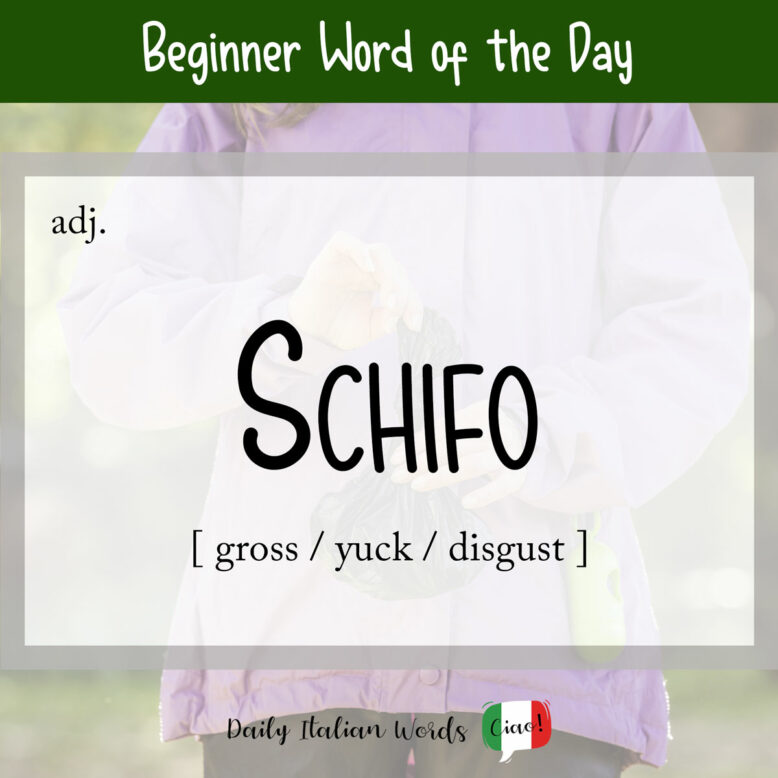A soiled diaper. A smelly sock. Or a dead spider in your bathtub. All of these can be succinctly described with a single Italian noun: schifo (gross / yuck / disgust).
schifo
gross / yuck / disgust

The term has roots in the Old French eschif and Old Franconian *skiuhjan, meaning to respect / revere something.
You will often see schifo in the company of the verb fare (to do / make). Fare schifo makes “to be disgusting,” or “to be gross” to use a colloquial translation.
Il cibo dei fast food fa schifo. Non lo mangio mai.
Fast food is gross. I never eat it.
When an indirect object pronoun such as mi, ti, gli and so on is involved, the most suitable translation is “to gross (someone) out” or “to disgust (someone)“.
Gli insetti gli fanno schifo.
Insects gross him out.
Il suo comportamento mi fa proprio schifo.
His behaviour really disgusts me.

Instead of saying fare schifo, you can also use the verb schifare, which carries the same meaning (e.g. i serpenti mi schifano = snakes gross me out). The reflexive schifarsi also exists, and is often followed by the preposition per (for). Various translations include:
- to be disgusted
- to be sickened by
- to loathe
- to detest
- to feel disgust for
Another verb you will see used with schifo is provare, meaning “to feel“. In this case, the translation would be “to feel disgust“.
By extension, schifo can also express something as awful or terrible without necessarily being stomach-churning. Indeed, it is frequently used to describe politics, society, or sports teams that aren’t up to par. A colloquial English expression that perfectly aligns with this usage of schifo is “to suck.”
Quest’anno la nostra squadra ha fatto proprio schifo.
This year our team really sucked.

A classic exclamation of disgust you are bound to hear within days of landing in Italy is Che schifo! which can be translated with any of the following English expressions:
- Yuck!
- Gross!
- Ew!
- Nasty!
Non infilare le dita nel naso! Che schifo!
Don’t stick your finger up your nose! Yuck!

If that weren’t enough, schifo can also refer to the very thing that elicits disgust. For instance, you can express that a meal or a vacation is uno schifo. Used in this way, it becomes a close synonym of schifezza (disgusting thing).
Questo hamburger è uno schifo. La carne sa di cartone!
This hamburger is disgusting (literally “a disgusting thing”). The meat tastes like cardboard!
Related to schifo is also the adjective schifoso:
- È un film che fa schifo! / È un film schifoso! (It’s a disgusting film!)
- Questo tempo fa schifo! / Che tempo schifoso! (This weather sucks! / What horrible weather!)
Here are the masculine definite and indefinite articles you will see used with schifo (note that the plural versions are less commonly used):
- lo schifo = the disgusting thing
- gli schifi = the disgusting things
- uno schifo = a disgusting thing
- degli schifi = (some) disgusting things
Finally, let’s delve into the expression da far schifo (literally “to make you sick”). It is employed to convey envy while suggesting a certain negative judgment. For example:
- ricco da far schifo = stinking rich (literally “so rich it makes you sick”)
- bello da far schifo = sickeningly handsome (literally “so handsome it makes you sick”)
- felice da far schifo = so damned happy (literally “so happy it makes you sick”)
Heather Broster is a graduate with honours in linguistics from the University of Western Ontario. She is an aspiring polyglot, proficient in English and Italian, as well as Japanese, Welsh, and French to varying degrees of fluency. Originally from Toronto, Heather has resided in various countries, notably Italy for a period of six years. Her primary focus lies in the fields of language acquisition, education, and bilingual instruction.


